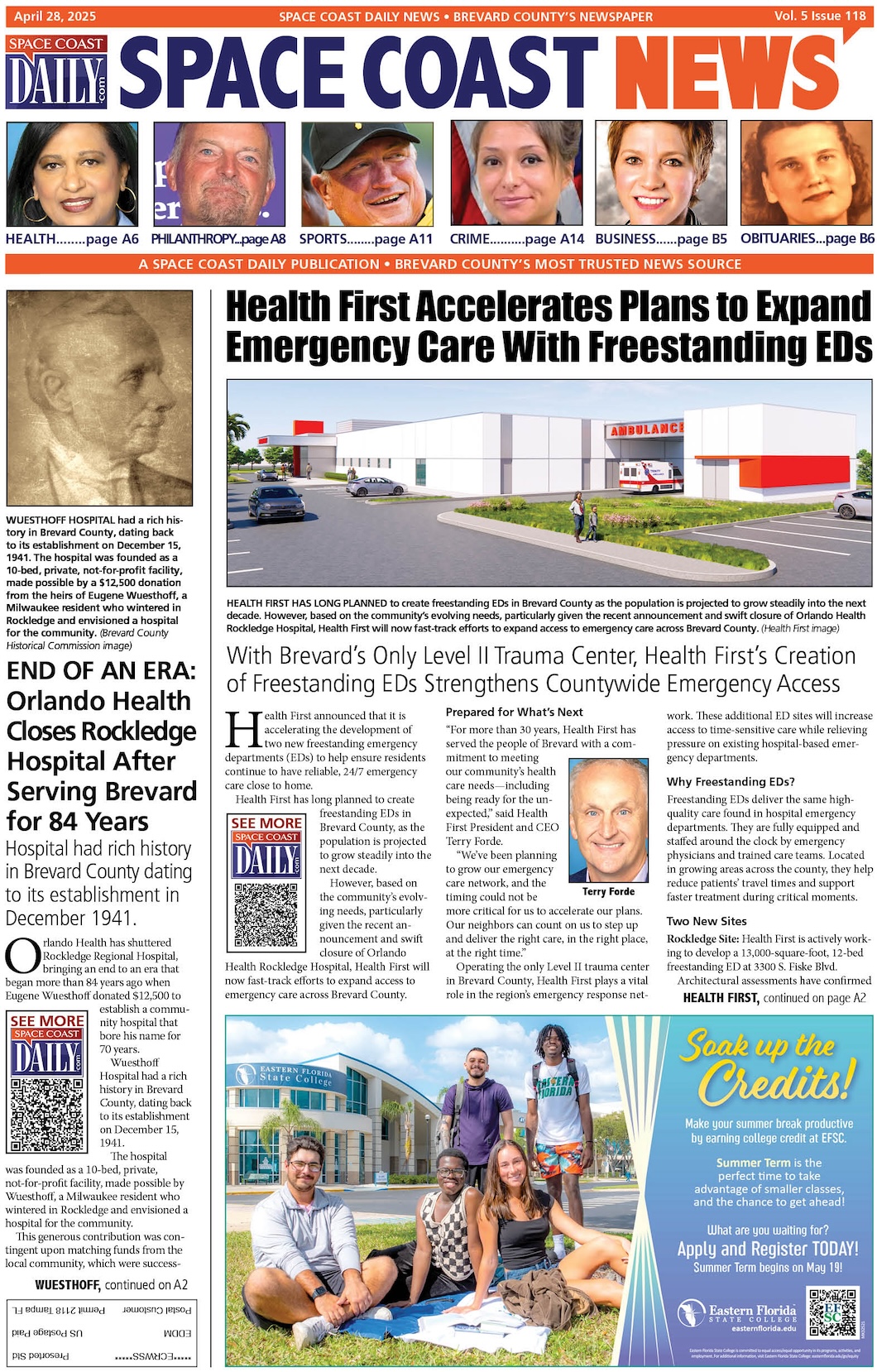Health First Experts Share How Unmanaged Stress Can Trigger Physical Illness and Mental Strain
By Space Coast Daily // May 29, 2025
Experts Warn Stress Can Leave a Mark on Both Mind and Body

BREVARD COUNTY, FLORIDA ─ Stress may start as a mental weight, but its effects on the entire body can be deep and lasting, especially on the heart. Health First experts say unmanaged stress can lead to serious cardiovascular, physical, and emotional health problems that shouldn’t be ignored.
According to the American Heart Association, chronic stress can contribute to high blood pressure, a major risk factor for heart attack and stroke. It’s also been linked to irregular heart rate and rhythm, inflammation, increased digestive issues and reduced blood flow to the heart.
According to Dr. John Strub, an Internal Medicine physician at Health First Medical Group, physical symptoms linked to stress are a common complaint among patients. Chest pain, headaches, and high blood pressure are just a few of the signs.
But the heart isn’t the only organ that stress can affect.
“When patients are stressed, we often see symptoms like headaches, abdominal pain and other physical complaints,” Strub said. Many patients don’t realize that stress may be the root of their physical symptoms, he explained.
“A lot of times, people will come in and they just seem to have a lot on their plate,” Strub said.
“They really don’t know where to begin to break that down. For the most part, patients try to handle their own stress by themselves, or they share that with a provider. It’s very dependent upon the patient.”
“While medical assistants often begin the visit by asking key screening questions, providers may not always dive deeply into mental or behavioral health concerns during appointments — especially if it’s outside their area of specialty,” Strub explained. “That’s why having a dedicated behavioral health team available is so valuable.”
“We are very fortunate to have an on-site behavioral health program,” he said. “If anyone manifests any symptoms of anxiety or depression, I refer them immediately over to the Health First Behavioral Wellness team.”

Beyond physical symptoms like headaches and chest pain, stress can create a ripple effect on overall well-being. DeAnn Collins, MSW, LCSW, Behavioral Services Clinical Manager at Health First sees firsthand how emotional stress can spill over into medical conditions.
Chronic stress can cause people to shift into a state of hyper-vigilance, she explained — a constant, exhausting “waiting for the next shoe to drop” type of feeling that can worsen existing health problems.
“The longer that we’re under perpetual levels of stress, it tends to rewire our brain and our body to stay in this hyper-vigilant mode related to pain,” Collins said.
This constant alertness often produces additional side effects such as brain fog, panic attacks, sleep disruptions and difficulty concentrating. Over time, these symptoms can snowball, deepening a person’s anxiety and worsening their physical symptoms. Conditions like chronic pain, irritable bowel syndrome and diverticulitis are often worsened by unmanaged stress, Collins added.
“People with chronic pain definitely have that mind-body connection with their mental health and their physical symptoms,” Collins said. “Oftentimes, the way that they think about their pain makes the pain worse, and so it reduces their daily functioning.”
When stress impacts daily activities, it can also take an emotional toll.
“It often prompts people to stop doing things that they enjoy,” she said. “The worse they’re feeling, as far as anxiety and depression, the more flare-ups they have of their medical conditions.”
Collins also explained that not all stress is bad — in fact, some forms can be beneficial.
“There’s something called eustress — it’s a positive kind of stress,” she said. “Think about when you’re planning a trip or starting a new job. You may feel anxious, your heart may race, and you may have butterflies in your stomach — those are all physical symptoms of stress, but in this case, they’re tied to excitement or motivation.”
The key difference between eustress and distress, she noted, lies in how we interpret those physical sensations.
“If we tell ourselves, ‘This is awful, I can’t handle this,’ we fuel distress. But if we think, ‘This is a great opportunity, I’m ready,’ our mindset shifts — and often, so do the symptoms,” Collins said. “When we view stress in a positive light, our body tends to respond more calmly.”
Personality can also play a role in how people handle stress. Collins said research suggests Type A personalities — often extroverted and achievement-oriented — may be more likely to experience eustress during new or high-pressure situations, while introverted individuals may be more likely to feel overwhelmed.

“But the great thing is, we can all learn how to better respond to stress,” she said. “It starts with our thoughts — and that’s something we can control.”
Sleep, Collins noted, plays a significant role in this cycle. It’s considered a foundational pillar of wellness, and when sleep is disrupted by stress, the body’s ability to heal and recover declines. Stress rarely causes just one symptom — instead, it typically triggers a web of emotional and physical responses that can make recovery feel overwhelming.
Recognizing the warning signs of unhealthy stress levels is key to early intervention. Collins said red flags may include sudden irritability, poor sleep, increased alcohol use and misuse of prescription medications. Being self-aware is important, too. People should pay attention to their own baseline behaviors and recognize when they are not feeling or acting like themselves.
“We do know what we’re like when we’re at our best, or what we’re like when we’re not,” Collins said. “We can also work to identify healthier coping strategies (such as regular exercise) for ourselves to help manage things when stress levels are ramping up.”
Parents should also be aware of how stress manifests in children, particularly as they transition into adolescence. Behavioral changes such as hair pulling or obsessive grooming, like excessive tweezing, can be signs of underlying emotional strain, Collins warned.
Fortunately, talking about mental health is becoming less stigmatized. Collins noted that the Centers for Medicare and Medicaid Services (CMS) now require depression screening to be included in patients’ annual wellness checks — an important step toward normalizing conversations about emotional health.












